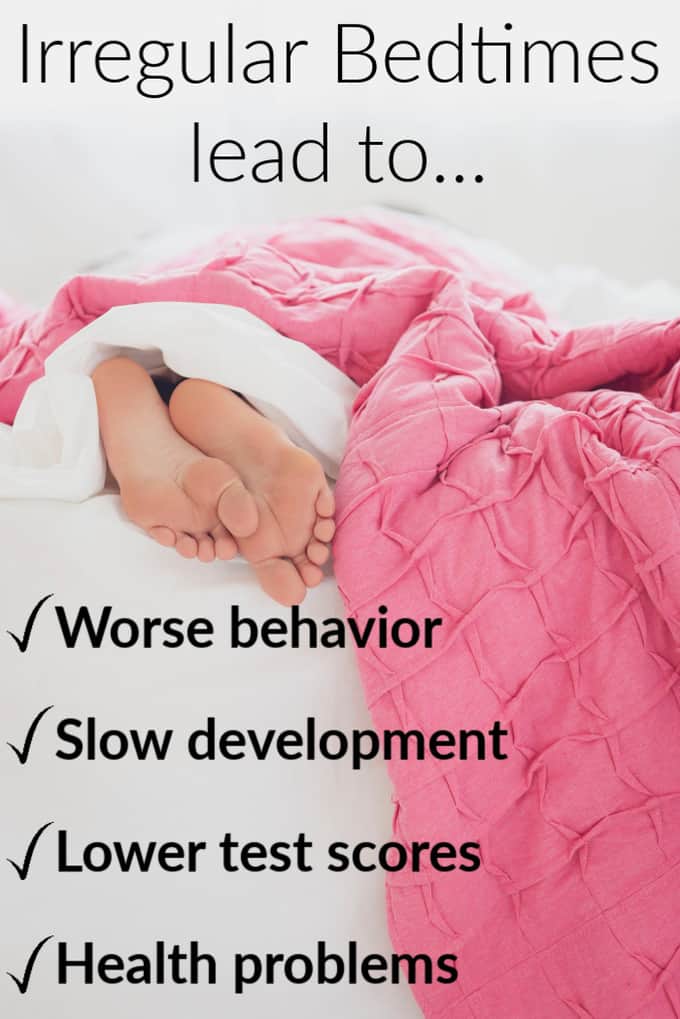CHILDREN WHO DON’T HAVE A REGULAR BEDTIME BEHAVE WORSE AND DEVELOP MORE SLOWLY
By Becky Mansfield
I just watched an episode on the TODAY show that proved what I already knew: Irregular Bedtimes for children (and adults) leads to worse behavior, slower development, and health issues.
Consistent routines & regular bedtimes for kids and adults is extremely important. Going to bed at 8:00 one night and 10:00 the next night is a mistake, according to the latest reports. Even a one-hour difference each night makes a significant difference.

While adults need to go to bed around the same time each night, so do children. Having an irregular bedtime for a child or children can impact more than just their health. According to the A. Pawlowski, contributor of the TODAY show: “Having an irregular bedtime routine and getting different amounts of sleep from night to night was linked to higher chances of having metabolic syndrome, which raises a person’s risk for heart disease, a new study published in Diabetes Care has found.
That means caution for people who might go to bed at 10 p.m. one night and 2 a.m. on the next, for example. Or those who get seven hours of sleep one night, and 10 hours the next.
Every one-hour increase in the variability of how long a person sleeps from night to night was associated with 27% higher odds of metabolic syndrome, and every one-hour increase in the variability of bedtime was associated with 23% higher odds, researchers said.
Is there proof that a child’s bedtime impacts their behavior?
Yes. British researchers held a study of 7-year-olds who had inconsistent bedtime. By the age of 7, more than half the children went to bed regularly between 7.30 and 8.30 pm.
The study looked at those children with regular bedtimes compared to those who went to bed at different times each night. They asked the mothers and teachers of these children if they saw a difference between those children and the ones who had a regular and consistent bedtime.
Telegraph says: “Researchers studied data on more than 11,000 seven-year-olds, whose parents had been questioned about their family routines when the children were aged three, five and seven.
At the age of seven, the children were given reading, maths and spatial awareness tests to determine whether their bedtime had any impact on their scores, and whether the effects built up or disappeared over time.
The results showed that children who did not have a regular bedtime at the age of three went on to score lower in all three tests, suggesting it could be a critical period in their development.”
The conclusion was that both mothers and teachers found that the group of children with irregular bedtimes were more hyperactive than their well-rested peers. They were also found to have behavior and conduct problems. These children had emotional problems, and social problems as well.
The results of this study “revealed that behavior grew worse the more years a child spent without a firm bedtime. But the good news is that children’s behavior noticeably improved when they switched to a scheduled bedtime.” – lifescience.com

Irregular bedtime leads to tantrums and crying.
Irregular bedtime for children has a BIG impact on behavior. Young children who don’t have a regular bedtime behave worse than kids who go to sleep at the same time each night.
According to an article published in 2013 on Medical News Today: Parents, teachers, and doctors all agree that lack of sleep makes children cranky, tearful and more prone to tantrums. They are more likely to have behavioral difficulties.
“Children with nonregular bedtimes had more behavioral difficulties. There was an incremental worsening in behavioral scores as exposure through early childhood to not having regular bedtimes increase.” – Academy of Pediatrics
Irregular bedtime affects the developing brain.
Children with irregular bedtimes had lower scores on math, reading and spatial awareness tests. By the age of seven, children with irregular bedtimes scored lower in all three aspects of intellect tested.
The study, published in the journal Pediatrics, found that irregular bedtimes could disrupt natural body rhythms and cause sleep deprivation, undermining brain maturation and the ability to regulate certain behaviors. “Irregular bedtimes affected children’s behavior by disrupting circadian rhythms (body clock), leading to sleep deprivation that affects the developing brain.”
Writing in the Journal of Epidemiology and Community Health, the researchers explained that sleep is “the investment needed to allow learning fresh the next day.”
Irregular bedtimes are similar to the effects of jet lag for children.
According to TIME magazine: “Such irregular bedtimes, the scientists say, are similar to the effects of jet lag for the children. Going to bed at different times every night can disrupt the youngsters’ circadian rhythms, which establish sleep-wake patterns, and can result in sleep deprivation. And just as adults who lose sleep suffer from its effects, so do young children.
“We know that early child development has profound influences on health and well being across the life course. It follows that disruptions to sleep, especially if they occur at key times in development, could have important lifelong impacts on health,” said Yvonne Kelly, one of the study’s co-authors and a professor in the Department of Epidemiology & Public Health at University College London in a statement.’
While previous work documented the increasing amount of disrupted sleep among older kids, who are distracted by computers, social media and video games well into the night, the current study documented that even at an early age, inconsistent sleep times can harm children’s development. The researchers found that the effects of poor sleep built incrementally as kids aged.

Irregular bedtimes have impacts on health and weight.
Children with irregular bedtimes were more likely to be overweight. They are also more likely to have lower self-esteem than others with a consistent bedtime. It was found that children who did not have breakfast and children who had irregular bedtimes were more likely to be overweight and obese by age eleven.
Children with a mostly-regular bedtime (example: different times on the weekend compared to the weeknights) were 20% more likely to be obese or overweight than those with a consistent bedtime.
“Early child development has profound influences on health and well-being across the life course. Therefore, reduced or disrupted sleep, especially if it occurs at key times in development, could have important impacts on health throughout life.” ~Telegraph
The good news (and what you can do)
Enforcing regular bedtimes during early childhood is an important influence on children’s behavior. It is one of the reasons that we are so strict about our kids’ bedtime.
The good news is that if your child has had inconsistent bedtimes up to this point, you can still help them. The effects were reversible. The children who picked up regular bedtimes showed improvements in their behavior scores. Talk to your children and pick a bedtime that is consistent every night. Explain the reasoning behind their new bedtime that is the same during the week as on the weekends and then jump right into the new schedule.
Good luck!



